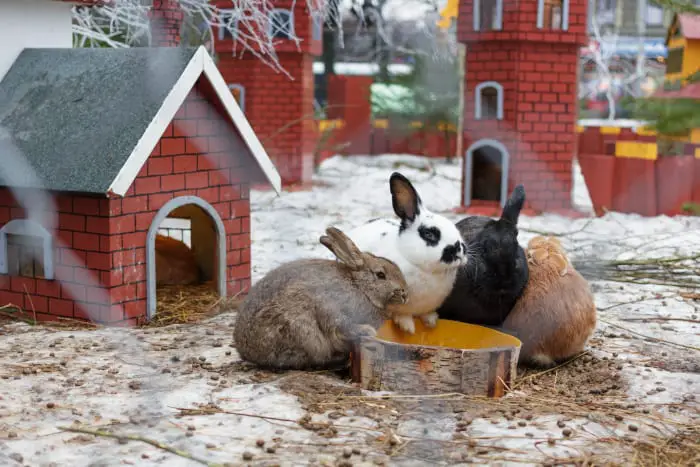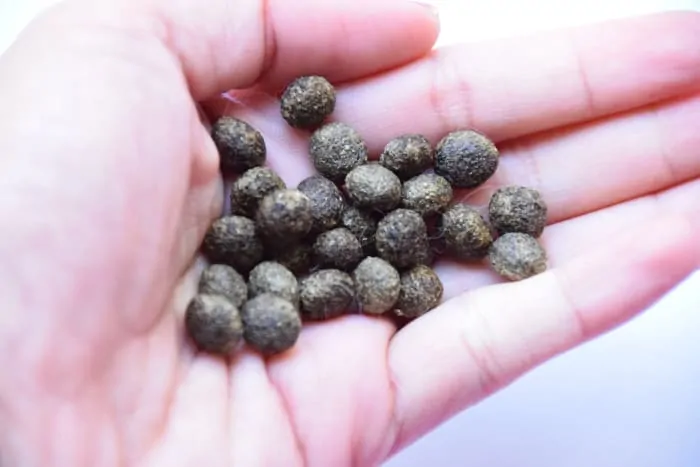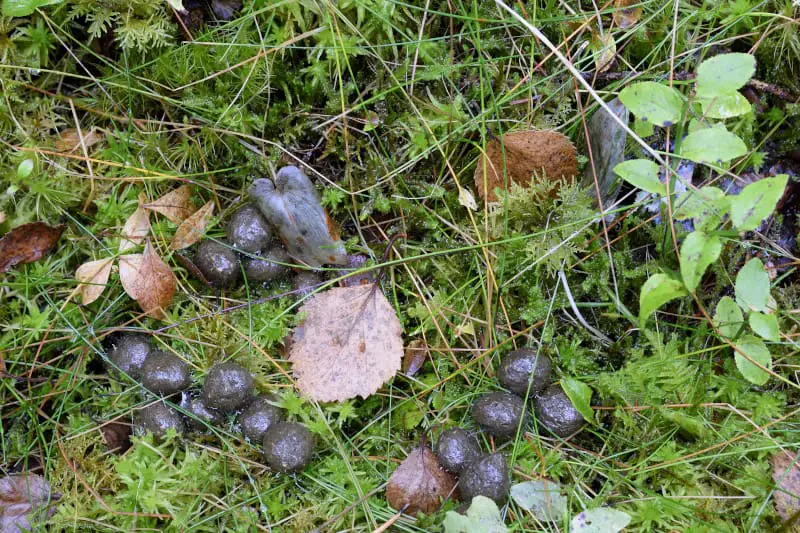Today we will talk about a subject that may be a little unpleasant for many but turns out to be extremely important for the rabbit’s life and health. We will engage in discussing useful things to know about rabbit poop.
Paying attention to the rabbit’s poop is very important because, through it, we can know if our rabbit is in good health. Noticing changes in the feces of a bunny can help us detect severe illnesses in time.
The Rabbit Digestive System
Rabbits have very delicate digestive systems. The fact that a rabbit remains healthy will depend significantly on its digestive system.
As we have already discussed in other articles, the rabbit’s digestive system works by pushing; that is to say, the food will pass through its gut as it continues to ingest more food. For this reason, the ingestion of hay is so important, as it is going to provide the necessary fiber to maintain good functioning and adequate motility.
Different Types of Rabbit Poop
A rabbit produces two types of excrement: regular fecal pellets and cecotropes. Below we will take a closer look at each one of them.
Normal Fecal Pellets
Unlike other animals, rabbit poop is not so unpleasant. Rabbit poops are in the form of small balls that are uniform in appearance, dry, and hard to touch. Usually, they have a brown color, which can sometimes be lighter or darker. These are very easy to clean and do not leave any bad smell.
Normal poop can vary in size between 7 and 12 mm, depending on your rabbit.
How Can We Tell if Our Rabbits Poop Is Normal?
To tell if your rabbit is doing well, the first thing you should do is learn to recognize normal poop. In addition to the characteristics mentioned above, the best way to know if your rabbits poop is as expected is to put a little pressure on it. By doing this, the poop will quickly break apart, showing digested hay on the inside.

Cecotropes
Cecotropes are another type of poop that is considered normal in rabbits. The cecotropes are a little brighter, softer, and they are produced in the form of clusters and emanate a little bit of scent. This type of poop is essential because it is rich in nutrients and vitamins of the B type.
It is not common to see this type of poop because usually rabbits produce them during the early morning and ingest them immediately directly from their anus. If you begin to see a greater quantity of cecotropes dispersed around, you should pay attention to your bunny’s diet as rabbits tend to produce more cecotropes when they ingest an excess of sugar.
Why Does a Rabbit Produce Two Types of Excrement?
The reason why a rabbit produces two types of excrement lies in its diet. Being a diet rich in fiber and cellulose, which is not exactly easy to digest, many times, when the food reaches the rabbit’s intestines, it still contains many nutrients that have not yet been absorbed by the organism. It is for this reason that rabbits have a very particular method of digesting food completely.
When the food reaches the rabbit’s intestine, these can divide their food into a digestible and non-digestible fiber. The non-digestible fiber continues its way along the colon until it reaches the rectum, where it is excreted in the form of fecal pellets.
Digestible fiber, on the other hand, goes to the cecum.
Cecotropes are produced in the cecum thanks to bacteria and fungi. These bacterias metabolize and transform the indigestible fiber into essential nutrients. It is common for a rabbit to eat these wastes to take advantage of these nutrients. These are very important for their nutrition and to help in its digestive function.
Once the cecotropes are re-ingested, they pass through the stomach and small intestine and arrive at the distal colon, where they are turned into fecal pellets.
Other Types of Poop in Rabbits
The two types of excrement mentioned above are those considered normal in rabbits. They are the ones which you should learn to recognize. You must remain attentive to distinguish any other change, either in its form, color, or consistency, because usually, these changes mean something.
In addition to the two poops mentioned above, which are the most common, we can also point out other types of excrement in rabbits which can occur in certain situations, such as the following:
Changes in Color
Rabbit poop usually has a brown color, which can sometimes be lighter or darker. These changes are not so significant if their consistency remains the same.
Changes in the diet can cause changes in the feces’ color; for example, very dark poops indicate that your rabbit is ingesting too much protein.
On other occasions, we can see that the feces take on a whitish color. A whitish discoloration usually appears when the rabbit urinates over the pellets, and when the urine dries, the calcium remains deposited on the poop giving it a whitish appearance.
Also, if you notice some blood, obviously you should take your rabbit urgently to your vet.
Changes in Shape
Changes in shape are also indicators of some conditions. These are the most common:
Poops Joined by Hair Strands
These poops come out linked together by a string of shed hair. Usually, there is a space between each pellet, forming like a string of pearls. This chained poop does not usually represent a problem, and the distance between each pellet means that our rabbit’s digestive system continues to function adequately.
Poops that come out with hair strands indicate that the rabbit is in the molting season and has swallowed a lot of hair when trying to groom itself. The problem tends to develop if this type of poop becomes very customary since an excess of hair in the gut can obstruct their intestines.
In this case, it is advisable to brush your pet rabbit more frequently to help it groom and eliminate the excess hair. In this way, your bunny will not be swallowing it in excess. We also suggest giving the bunny fresher greens, free access to hay, and plenty of water to keep your bunny hydrated.
Double Poop
Double poops develop when the rabbit’s digestive system slows down for any reason, and two pellets collide during their formation, creating a double poop.
Double poops develop if the bunny is stressed or as the rabbit advances in age. The change may be momentary due to some stress, and after several hours when it is calmer, the rabbit will return to making normal poops.
But if your rabbit starts to do more than two or three doubles or even triples a day, it might be time to ask your vet. He will be able to prescribe a stimulant to help your rabbit’s bowels return to a normal rhythm.
Small Round Poops
A rabbit can temporarily make small, rounded droppings when it goes through some stressful experience. In this case, it will not represent an issue because its excrements will return to normal in a few hours. However, when the defecation of small stools is prolonged, we should be attentive since this could indicate that our pet is suffering from pain or has some narrowing or partial blockage in its intestine, which can put its life in danger.

Small Misshapen Poops
Small, misshapen poops indicate your bunny is not getting enough food or is dehydrated. There are several reasons your bunny may not want to eat, such as dental problems. In these cases, it is always essential to take your bunny to the vet.
If this occurs after surgery, it is considered a good sign. It indicates that the digestive system is working adequately and will begin to generate average-sized poops as soon as the rabbit begins to feed regularly.
Egg Shaped Poops
Large egg-shaped poops can result from a condition known as megacolon. Megacolon is a rare genetic condition, but it can also arise after a trauma. If you notice this type of poop and suspect your rabbit has a megacolon, you should consult a vet about appropriate care.
Changes in Poop Texture
The changes in poop texture can also be very revealing in terms of our pet’s health. A change in consistency usually represents something that must be addressed immediately.
Mucous Covered Poops
You may sometimes find a small amount of mucus in their poop. When the amount of mucus is small, it is a sign that your rabbit has just gone through a little gastrointestinal stop.
Mucous can also be caused by anything which can irritate the intestinal lining, such as the use of antibiotics. It can also happen that your rabbit enjoys some food so much that it forgets to chew it well. Mucous might be present for parasites or other severe disorders like cecal impaction.
You must visit your veterinary doctor if you observe thick stringy mucous in your rabbit’s poops, especially if the mucous is persistent.
Cecal Dysbiosis
Cecal dysbiosis characterizes by the appearance of a paste-like mass along with poorly formed cecotropes. The smell of this poop is quite strong.
Some of the causes of Cecal dysbiosis are usually the following:
- Stress
- A diet rich in starch, fat, or sugar
- Obesity
- Joint pain and aging of the digestive tract in old bunnies
- Dental problems
- Urinary tract issues
- Respiratory tract infections
These conditions cause an imbalance in the bacteria found in the cecum. Cecal dysbiosis is a symptom of some disease that can be more complex, so you should watch any rabbit with dysbiosis for signs of illness.
Diarrhea
Diarrhea in a rabbit is something that should be treated with urgency. A rabbit with diarrhea can become dehydrated quickly. Diarrhea is also an indication that something is not working well in the gastrointestinal tract, and therefore, bunnies will not be assimilating the nutrients they need.
These are some of the causes which can provoke diarrhea in your rabbit:
- Infection by parasites
- Exposure to poisonous substances
- Diet high in protein and carbohydrates and low in fiber
- Antibiotics
- Very young rabbits that have been weaned before they are ready
Diarrhea must be treated with urgency regardless of the age of any rabbit.
As we have already seen, the rabbits’ feces can tell us a lot about their health condition. You must remain vigilant and careful with your rabbit poops.
On the other hand, average sized bunnies will make 200-300 poops per day. If you notice that your rabbit has stopped pooping, this could be a sign of something important, like a hairball causing a gastrointestinal arrest. If this is the case, you should get your bunny checked with a vet as soon as possible, as a situation like this can be fatal.

